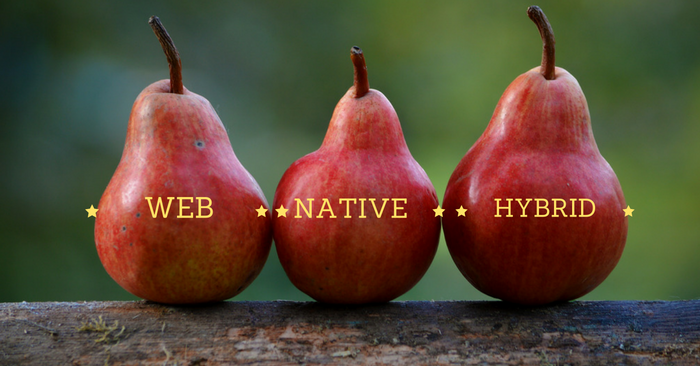So you have decided that your business needs mobile apps to boost productivity and to stay competitive, and you have decided which professionals to trust with the development. But you have faced another tough question: are web apps, native apps or hybrids the best for your business?
All solutions have their pros and cons, and it mainly depends on your needs and resources to choose one or the other. What is important is that you don’t let yourself talk into any of these options just because that’s the main profile of the developer. A good professional team will closely follow technology trends to be able to provide you with the solution that is most suitable to your needs.

Web Apps: Adapting Kings
They are more than websites optimized for mobile devices: with strong backend functions and interactive features, they are powerful companions to businesses. At the same time, they are browser-based, distributed on the web, and updated automatically – just like a website.
It’s a great choice mainly for consumer apps, where you have to provide a solution for many diverse platforms. In a better-regulated business environment, it can still be a viable alternative if you have a tight budget but still want to exploit mobile opportunities, or if you want your app to be more informational than transactional.
Pros
- You only need to develop it once to run on all devices.
- Every update will automatically appear in the app and users will all have the same version.
- You don’t need approval from a third party for a release.
- Due to automatic updates, A/B testing features can be done effectively.
- Since your app can be opened in a browser without downloading anything, users are more likely to give it a try.
Cons
- Specific mobile functions, such as sensors or local databases, can only be partially integrated.
- Different mobile browsers might cause bugs that hinder performance.
- Network limitations: your users will need to be online to use the app.
Native Apps: Speed Champions
These are apps that use the native programming language of a certain device and can fully integrate its features. They are distributed through app markets where users download them and install them on their devices. In June 2016, business apps were the second most popular category in the Apple App Store. However, a separate app is needed for each platform (or at least the most popular ones).
It’s a great choice if you want to provide an extraordinary user experience, if your site is more transactional than informational, or if you are considering to monetize your app later on.
Pros
- An installed app runs faster than any other application, even it is loaded with extensive graphics.
- Full integration allows the user experience to be taken to the maximum.
- The app stores make apps easier to find, download, or update.
- These markets have strict rules to accept new apps and they also provide regular security checks.
- It is easier to include offline functionality to an app that is installed on the user’s device.
Cons
- Multi-platform development, maintenance, and updating have higher costs.
- Because of the several programming languages, it is also more difficult to track and eliminate bugs.
- The distribution and availability of updates depend on third parties (app stores).
Hybrid Apps: A Better Version of Both Worlds
Hybrid applications combine the resource-saving characteristics of web apps and the adaptability of native apps. They are web apps at the core, wrapped in platform-dependent layers depending on which device they will be used. This way, they can look and feel like a native app, for a fraction of its costs.
It’s a great choice if you want to develop several apps for your business processes, but with better distribution and promotion opportunities, especially if you have a BYOD policy in place.
Pros
- Easy to adapt: it has platform-specific native qualities.
- Easy to develop: almost like a web app, you only add a mobile framework.
- Offers full integration with device features: just like a native app.
Cons
- Redesign needed: even if you have a web app ready, you need to make sure the designs match the different operating systems.
- Mobile framework expertise needed: your in-house programmers, as well as your support team, might find this job challenging.
- Limited graphics: just as with web apps, hybrid apps can’t carry graphic-heavy content.




